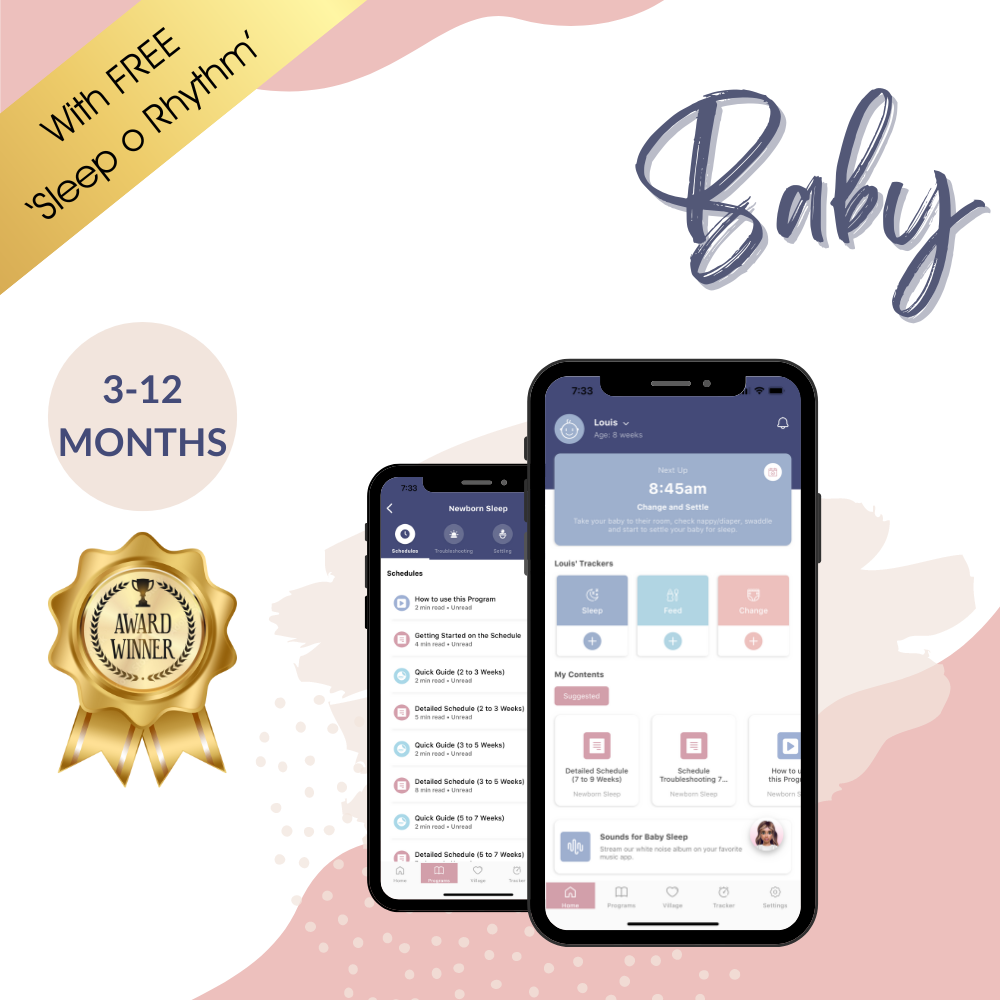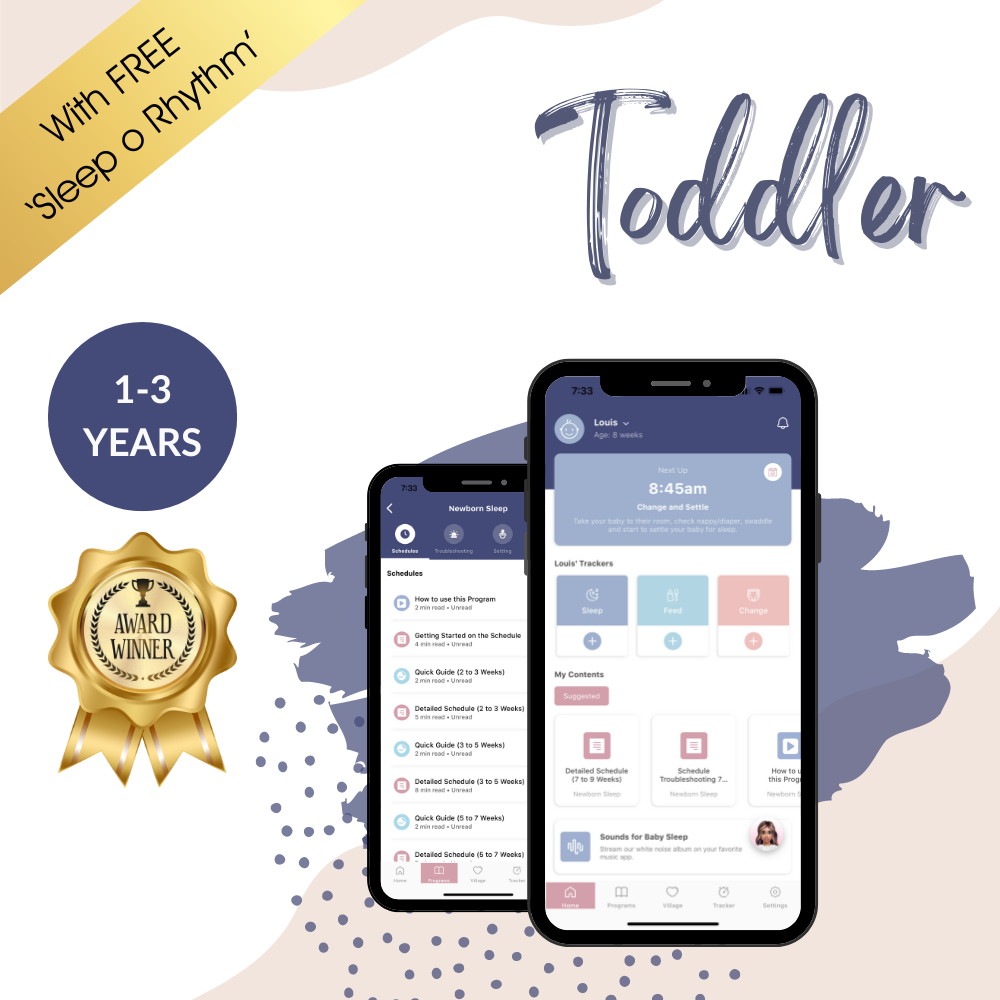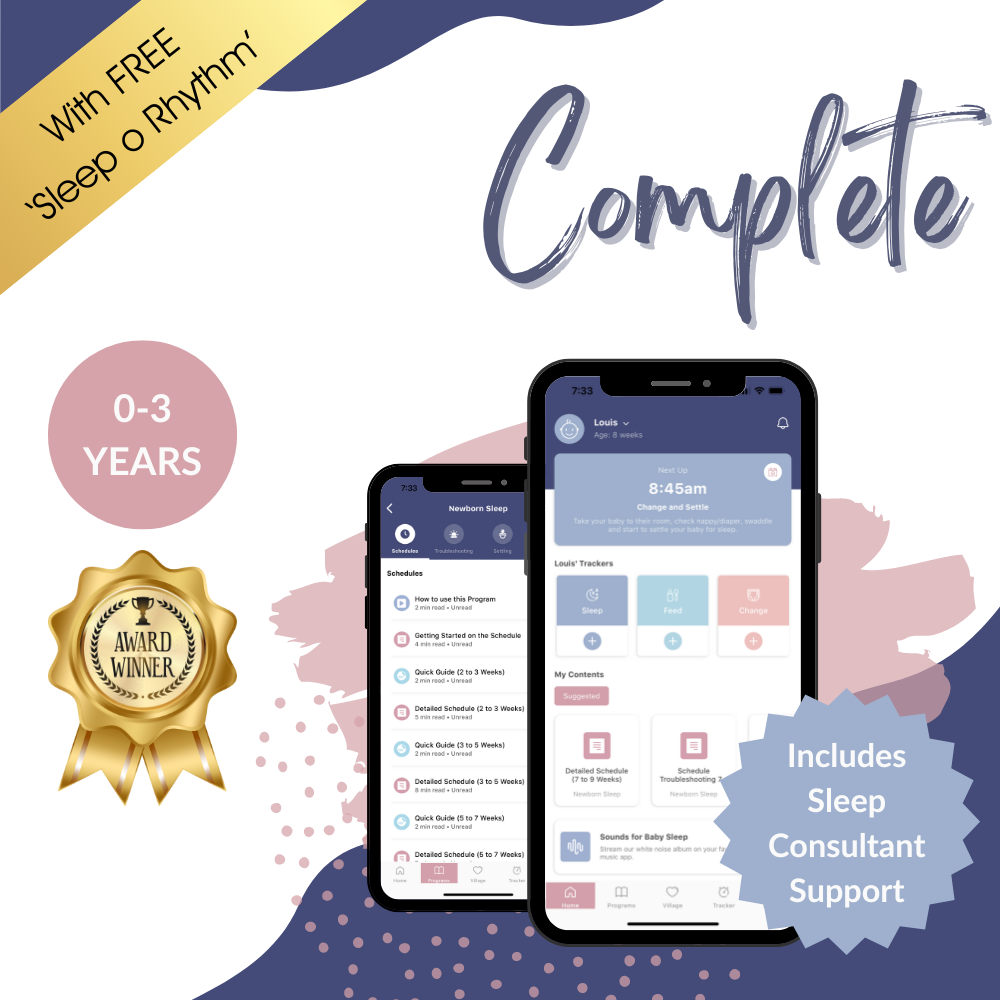
8 Month Old Sleep Schedule: Regression, Settling & Night Waking


At eight months your baby is growing fast, rolling, perhaps crawling, pulling to stand, babbling and becoming more aware of their world. All of this development is wonderful, and it often affects sleep. Let’s walk through what a healthy sleep rhythm looks like at this age, how to support it, and simple ways to respond when things feel tricky.
Overview
-
Daytime naps at 8 months: Many babies have transitioned from three naps to two. Read more about nap transitions in this article.
-
Night sleep for 8 month old babies: Most babies at this age can sleep a longer overnight stretch without needing a feed if daytime nutrition is solid and sleep habits are consistent.
-
Total sleep: Aim for roughly 14.5 hours of sleep in 24 hours.
-
Wake windows for an 8 month old baby: As your baby drops the third nap, wake windows will be 2.5 hours earlier in the day and up to 4 hours before bedtime in the evening.
-
Nap transition at 8 months: With the third nap dropping away, bedtime and nap timing become even more important.
-
8 month sleep regression: Between eight and ten months many babies experience a temporary bump in their sleep due to developmental leaps such as crawling, pulling up or separation awareness. This article has more information on the 8 month sleep regression.
8 Month Old Sleep Schedule
Here’s a sample schedule that you can adapt to your baby’s natural wake time and family rhythm:
|
Time |
Activity |
|
7:00 am |
Wake up |
|
9:30–10:00 am |
First nap (short nap) |
|
12:30pm |
Second nap (long nap) |
|
6:30 pm |
Begin bedtime wind down routine |
|
7:00 pm |
Bedtime |
Notes / adaptations:
-
If your baby is still taking three naps (some at this age do) watch for signs it’s time to move to two.
-
Ensure last nap ends by 5:00 pm so bedtime around 7 pm remains realistic.
-
Use awake windows of roughly 2.5 hours before the first and second nap, then closer to 4 hours before bedtime.
-
Solids meals should sit alongside breast or bottle feeds, not replace the primary milk feeds.
Creating a Bedtime Routine for 8 Months Old
A consistent bedtime routine is one of your strongest supports at this age. It gives your baby predictable cues - this is the sequence, now we’re winding down, now it’s sleep time.
Routine elements you might include:
-
Calm play or quiet interaction 20-30 minutes before sleep time.
-
Dim lights / reduce stimulation.
-
A bath or warm wash.
-
A story, song or lullaby.
-
A feed.
-
Cuddles, comfort, perhaps a transition into the sleep space (crib or bassinet) while drowsy but showing signs of sleep readiness (yawning, rubbing eyes, zoning out).
-
Put down in bed while sleepy but still awake, to help support self-settling later.
-
Offer a consistent sleep environment - dark or dim, comfortable temperature, minimal distractions, perhaps white noise if helpful.
By repeating similar steps every evening, you build strong sleep-association cues, and that helps your baby anticipate and accept the transition to sleep more easily.
Solids and How They Affect Sleep at 8 Months Old
At eight months many babies are more established with solid foods (complementing breastmilk or formula) and that has implications for sleep. We have a comprehensive article about solids here.
What to keep in mind:
-
Solids don’t replace milk of course - at this age milk still provides a large portion of calories and should not be neglected. If daytime milk feeds are reduced too much in favour of solids, your baby may wake at night due to hunger.
-
Solids can aid sleep indirectly by helping ensure your baby’s overall nutrition is met and stable, reducing hunger-wakes at night. A well-fed baby during the day often sleeps better at night.
-
The timing of solids can matter. A solid meal too close to bedtime may mean digestion is active while trying to sleep; earlier solids, an adequate milk feed and a calm wind down generally support better sleep.
-
If your baby is refusing solids or only nibbling, check whether milk feeds are sufficient and whether awake windows or nap timing might be affecting appetite.
In short: solids are an important part of your baby’s schedule at eight months, and paying attention to them helps support sleep rather than interfere with it.
Night Waking and Self-Settling at 8 Months Old
Even if your baby has been sleeping fairly well, around eight months you may notice more awakenings at night, more fussing, harder settling. Here’s how to approach it.
Understanding night waking:
-
Night waking can be triggered by developmental leaps, changes in sleep cycles, teething, separation anxiety or transitions (like nap drops).
-
It may not always mean hunger - sometimes your baby’s brain or body is just more active or excited, or the sleep environment has changed or become less optimal.
-
Be careful not to reinforce unwanted associations (for example feeding every time your baby stirs, if you want to reduce those) because habits formed now can last.
For more information on night waking, read this article.
Supporting self-settling:
-
One of the best gifts you can give your baby is the ability to settle themselves when they wake between sleep-cycles (or at bedtime) without relying on external help (nursing, rocking, being held). This ability supports better, longer sleep stretches.
-
To support self-settling:
-
Ensure a consistent bedtime routine and put to bed while your baby is sleepy but awake.
-
Keep the sleep environment consistent so the crib/bed doesn’t feel like a big change.
-
If your baby wakes and fusses, pause to give a few moments - your baby may resettle on their own. If they need help, offer minimal intervention (e.g., soothing voice, gentle pat) rather than picking up immediately, if appropriate for your comfort and values.
-
If a feed is not needed at night, consider whether daytime milk/solids are sufficient, and whether your baby’s sleep-associations or routine need review.
-
Maintain consistency with how you respond, so your baby knows what to expect each night. Consistency helps build trust and security.
If you need more guidance with self-settling, check out our article here.
Understanding and Navigating the 8-10 Month Sleep Regression
This phase is sometimes called the “8-10 month sleep regression” because it can hit anytime between around 8 to 10 months.
What’s going on:
-
Your baby’s brain and body are doing a lot: new mobility (crawling, pulling to stand, maybe cruising), cognitive leaps (object permanence - understanding that things exist even when out of view), increased separation anxiety, teething
-
Nap transitions (dropping from three naps to two) often coincide with this period, which adds another layer of sleep disruption.
-
The regression is temporary - the good news is your baby doesn’t go backwards permanently, they’re just re-adjusting.
Signs you might be experiencing it:
-
More frequent night awakenings, longer periods awake at night.
-
Naps take longer to settle, or are shorter than before, or baby refuses them.
-
Bedtime routines become harder - more resistance, more fussing.
-
Baby shows increased clinginess or separation anxiety at nap/bedtime.
-
Your previously fairly smooth schedule feels a bit disrupted or inconsistent.
How long might it last:
-
It varies from a few days to several weeks (often 3-6 weeks) depending on your baby and the circumstances
-
The better supported your baby is (good routine, environment, nutrition), the smoother you may get through it.
What you can do:
-
Stick to your consistent routine and schedule as much as possible.
-
Offer plenty of floor time and awake-time practice of new skills so baby isn’t trying those new moves at bedtime. (If baby has had enough practice during the day, less urge to practise at night or in the crib.)
-
Check wake windows and naps - overtiredness makes regressions worse.
-
Ensure sleep environment is optimal (dark, white noise, comfortable temperature).
-
Provide extra support and reassurance (especially if separation anxiety is strong) but avoid creating long-term new sleep associations unless that is your goal.
-
Be patient. This is a phase that will pass.
How to Support Sleep at 8 Months
-
Consistent wake up and nap times
A predictable schedule helps your baby’s internal clock settle. Try to start the day around the same time each morning and aim for naps at consistent times that match your baby’s wake windows. -
Bedtime routine matters
Continue with a soothing wind down, such as bath time, quiet play, reading or songs, followed by a feed and putting your baby down drowsy but awake. These familiar steps help your baby anticipate sleep. -
Watch wake windows carefully
As your baby moves to two naps, you’ll likely notice wake windows of about two and a half hours before naps one and two, around four hours before bedtime. Adjust as your baby shows signs of tiredness. -
Ensure good daytime feeding and active awake time
When your baby’s awake times are meaningful, giving them a chance to practise skills, move and explore, they’re more likely to sleep well. Make sure they’re getting enough calories during the day to support longer stretches of overnight sleep. -
Support the nap transition gently
If you’re moving from three to two naps, don’t rush the change. Allow for short cat naps if needed, and when the first and second naps are solid, the third will naturally drop away. -
Expect and reassure when sleep bumps happen
Developmental leaps at this age can lead to more night wakings or harder settling - this is known as the 8 month sleep regression. This doesn’t mean something is wrong, it simply shows how busy your baby’s brain and body are. Stay consistent and reassuring.
Common questions and how to handle them
Q: Is my baby still allowed a night feed?
A: Many eight month olds no longer need night feeds, provided their daytime nutrition is solid and they’re gaining well. If a feed remains, especially if it’s more of a habit than hunger, consider whether the daytime schedule, nap timing or sleep associations might need adjusting.
Q: My baby fights naps or takes very short naps, what should I do?
A: Short naps can result from overtiredness, poor nap timing or parent-controlled sleep associations. Review the wake window before that nap, add a quiet wind down, and ensure the sleep environment is calm and consistent. Perhaps it's time to look at some self-settling.
Q: Bedtime keeps slipping later yet wake ups are early, why?
A: Late naps or too much daytime sleep can push bedtime late, which may then lead to early morning wake ups. Try to end the last (very short) nap by 5:00 pm and aim for bedtime around 7:00 pm if possible.
How Our Sleep Programs Support You
Our Sleep Programs give you age specific schedules, methods and settling cues, helping you tune into your baby’s unique rhythm rather than chase generic rules. At eight months you’ll find guidance for two nap routines, gentle self-settling methods and advice for navigating those developmental leaps with confidence.
Final Thoughts
Eight months is a beautiful and busy stage. Your baby is more mobile, more curious and more interactive, and sometimes this can make sleep a little unpredictable. The good news is that with gentle consistency, a reliable routine and responsive support, you can help your baby and yourself move through this phase with more ease.
Remember, your baby is learning, your routine is evolving, and it’s perfectly normal for things to feel a bit bumpy as you adjust. You’re doing a remarkable job.





